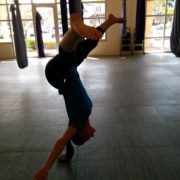Might integrating trauma-informed yoga into group psychotherapy be helpful in healing and health?
As a trauma-informed yoga teacher and holistic psychotherapist, I’m always on the outlook for new ways to integrate these two (East meets West) healing modalities, better supporting the alignment of the body, mind and soul (think spirituality). Research continues to emerge in support of integrating both with positive effects. As we continue to expand our understanding, we are learning that treating the mind (psychotherapy) separately from the body (yoga) limits the healing benefits. Just as we are learning that treating the body (medical health) without considering the mind (mental, emotional health) limits healing. Yet, as I have written about in a previous Blog, there are many yoga style options.
What makes trauma-informed yoga different? A central tenet of such an approach is choice. As such, the language used to guide students is specific to creating a choice-based environment and reminds them that they are always in control of their practice. Certain words are used to empower participants to make choices that feel comfortable and invite a more gentle compassionate approach. The teacher’s role is to be a supportive and non-judgmental presence. They are aware of how their own movements and interactions are perceived, demonstrating predictability and consistency to create and maintain safety. In maintaining such healthy boundaries, they model those boundaries, which includes no physical assisting as such assisting may be triggering to someone recovering from trauma. Trauma-informed teachers ‘invite’ participants to draw their awareness to the sensations in their bodies to guide them in their choices of shapes and timing of their movements, not ‘tell’ them what to do and when. Even the guidance around how to breathe in such a class is a suggestion to find a supportive breath that invites comfort. So no focus on holding the breath is offered. If you are interested in reading more about trauma-informed yoga, I would suggest checking out Zabie Yamasaki’s website here.
Trauma-informed yoga is new. In fact, in 2017 the Trauma Center’s trauma sensitive yoga (TCTSY) became the first dedicated yoga program in the world to be listed as an evidence-based program/practice of psychological trauma. So how excited was I to read the emerging research on integrating trauma-sensitive yoga into group psychotherapy for at-risk groups, such as survivors of intimate partner violence.
What this research suggests is that it may not only have positive effects for clients in Group Therapy, but also for the care providers! If you would like to read more about this research, click the box below:












Leave a Reply
Want to join the discussion?Feel free to contribute!